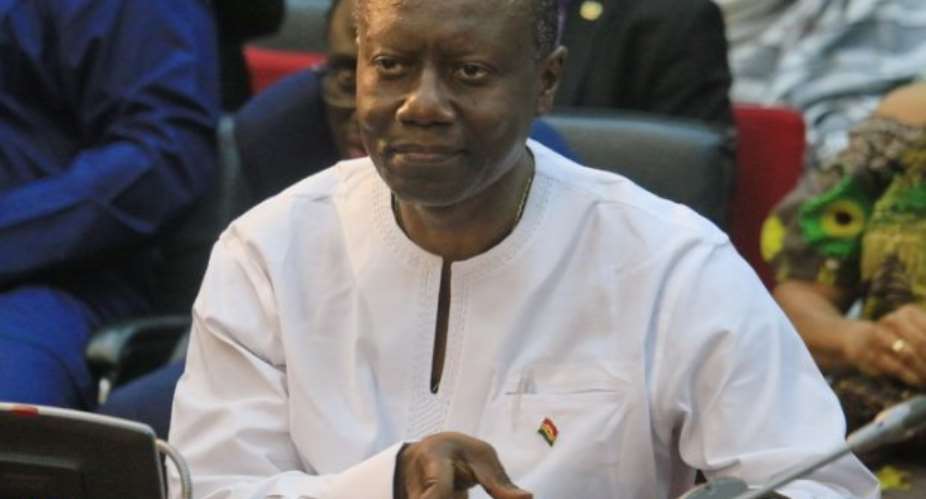The Ministry of Finance has launched the Tax Revenue for Economic Enhancement (TREE) project in Cape Coast.
The revenue collection-led strategy, which places priority on improving the revenue collection and enforcement processes, is expected to improve the revenue of the various Municipal, Metropolitan and District Assemblies (MMDAs) in the country.
Speaking at the launch, the Minister of Finance, Ken Ofori Atta, charged the District Assemblies to toughen their revenue collection base to feed into the ‘Ghana Beyond Aid’ agenda.
“The Tax Revenue for Economic Enhancement project has, therefore, come at the opportune time to help increase revenue generation at MMDA level and reduce the pressures on the consolidated fund.
“New technologies like the Taxman software being deployed by the project will help overcome common revenue administration challenges in Ghana,” he explained.
According to the Minister, Ghana as a Lower Middle-Income country is transitioning away from dependency on development assistance and the government of Ghana will increasingly rely primarily on domestic resources to finance its development agenda.
Ken Ofori Atta explains that the government is rather leveraging development assistance to build the internal revenue generation capacities of selected MMDAs to serve as a catalytic use of resources to ensure that economic development is sustainable and irreversible.
Program director, VNG International and the International Cooperation Agency of the Association of Netherlands, Peter Jongkind, urged the District assemblies to organize sustainable funding cycle in which they determine how these new revenues would be spent.
This, according to him will put them in the driving seat of their own future, promote a sustainable increase in internally generated funds and enable them to improve basic services to their citizens.
“It will be remarkable, exciting, but also a difficult and challenging journey for all of us, with only one focus: a better future for all Ghanaians and realization of Ghana beyond aid,” Jongkind said.
Peter Jongkind explained why some Assemblies fail to improve their revenue collection. To him, many of the Assemblies are not creative enough to withstand the shocks associated with the generation of funds.
“Some of the challenges in which MMDAs face in nurturing this young tree include a lack of knowledge on how to grow the tree; inadequate communication with citizens about the payment of taxes and what the services the citizens will receive in return and the lacuna in the many financial leakages, tax gaps,” he added.
Central Regional Minister, Kwamina Duncan, says Ghana must take a critical look at the fiscal decentralization policy which invariably involves the effective mobilization and judicious use of funds.
He is confident Ghana cannot develop as expected if it continues to rely heavily on external fiscal inflows from central government and development partners.
“This TREE project resonates with the President’s call to help build a Ghana Beyond Aid,” he argued.
Head of the Office of Local Government service, Dr Nana Ato Arthur, expressed his excitement that the TREE project has its focus on the property rate, the business operating permit and the building permit.
To him, these areas are very important source of revenue for local administrations all over the world.
“From an inter-governmental and fiscal decentralisation perspective, the more revenue MMDAs can generate, the more autonomy they will have.”
Currently, the internally generated funds are the only funds that MMDAs have total control over because the Common Fund and most development partner funds are targeted toward development project, and therefore cannot be used for recurrent expenditures, he added.
The official launch of the 4-year programme being funded by the Royal Netherlands government with the overall objective of eliminating the inefficiencies that impede MMDAs’ optimal local revenue mobilisation, improve the involvement of citizens in local decision making and ultimately to enhance service delivery to the general public.
Participants of the workshop include the Dutch Ambassador to Ghana, His Excellency Ron Strikker, Chief Executives, coordinating directors, budget and finance officers drawn from across 32 MMDAs in the Central, Western and Ashanti regions.





 Former Kotoko Player George Asare elected SRC President at PUG Law Faculty
Former Kotoko Player George Asare elected SRC President at PUG Law Faculty
 2024 elections: Consider ‘dumsor’ when casting your votes; NPP deserves less — P...
2024 elections: Consider ‘dumsor’ when casting your votes; NPP deserves less — P...
 You have no grounds to call Mahama incompetent; you’ve failed — Prof. Marfo blas...
You have no grounds to call Mahama incompetent; you’ve failed — Prof. Marfo blas...
 2024 elections: NPP creates better policies for people like us; we’ll vote for B...
2024 elections: NPP creates better policies for people like us; we’ll vote for B...
 Don’t exchange your life for wealth; a sparkle of fire can be your end — Gender ...
Don’t exchange your life for wealth; a sparkle of fire can be your end — Gender ...
 Ghana’s newly installed Poland train reportedly involved in accident while on a ...
Ghana’s newly installed Poland train reportedly involved in accident while on a ...
 Chieftaincy disputes: Government imposes 4pm to 7am curfew on Sampa township
Chieftaincy disputes: Government imposes 4pm to 7am curfew on Sampa township
 Franklin Cudjoe fumes at unaccountable wasteful executive living large at the ex...
Franklin Cudjoe fumes at unaccountable wasteful executive living large at the ex...
 I'll 'stoop too low' for votes; I'm never moved by your propaganda — Oquaye Jnr ...
I'll 'stoop too low' for votes; I'm never moved by your propaganda — Oquaye Jnr ...
 Kumasi Thermal Plant commissioning: I pray God opens the eyes of leaders who don...
Kumasi Thermal Plant commissioning: I pray God opens the eyes of leaders who don...
